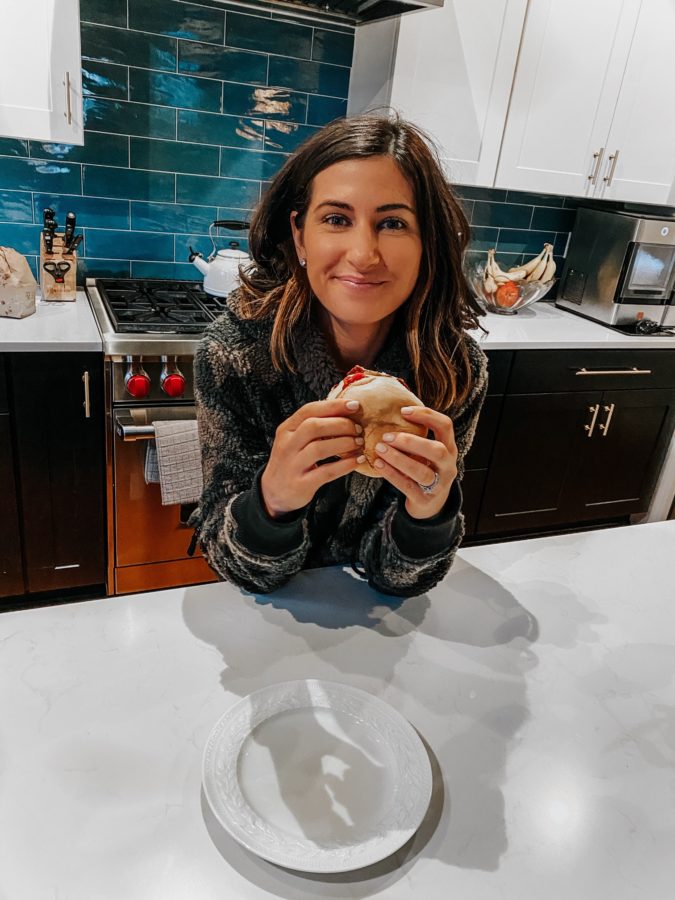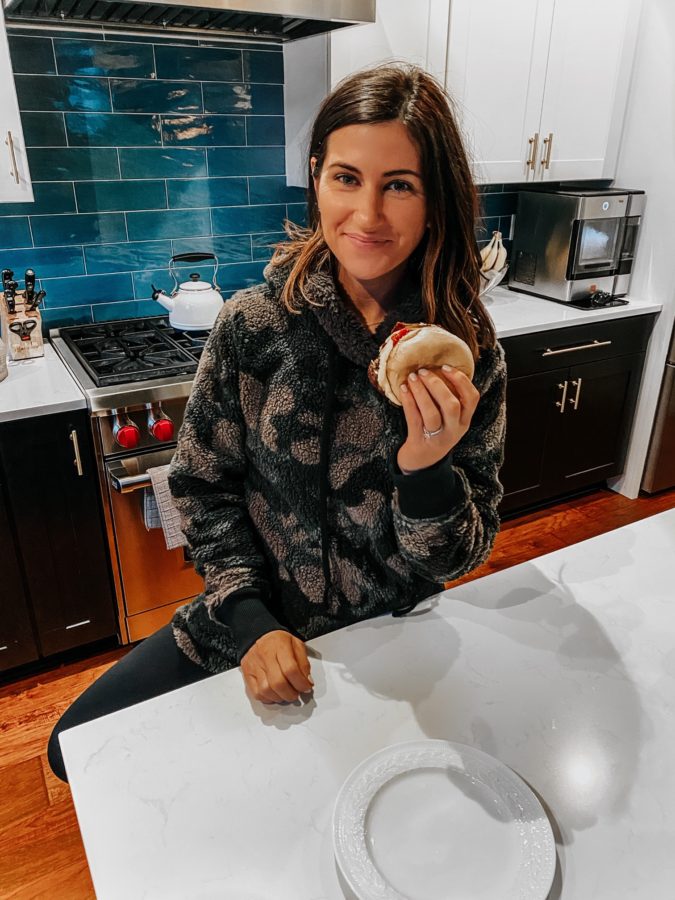
It’s no secret that eating more vegetables is good for your health. No one is disputing that fact. However, a big trend in 2019 (and will continue to be popular in 2020) was a shift to eating a more plant-based diet. People are making the switch to a vegan or vegetarian diet in the name of health. I’m a HUGE fan of eating more plants, but do we need to eliminate all animal products as well to be healthy? Well, according to the Netflix documentary The Game Changers we do.
A few weeks ago I watched the popular Netflix documentary with my husband and initially found myself getting sucked into what they were selling. However, once the film was done I was able to take a step back, filter through the fear based propaganda, and form my own opinion.
The Game Changers is a documentary that follows MMA fighter James Wilks through his transition journey to a plant-based diet. I found myself getting sucked in because I am also recovering from a knee injury (and possible surgery on the horizon) and he is convinced a plant-based diet helped him recovery faster and have improved performance in his training.
Like many other Netflix “health” documentaries this was was one-sided, fear based (using lots of big and scary science-y words), and biased with some kernels of truth sprinkled in. The studies used to demonstrate their point were strategically cherry picked and the interviews with top doctors were misleading. Throughout the documentary they show that a handful of top athletes (all men but one) that switched to a plant-based diet and were performing extremely well.

A big problem I had with the film was that they never got specific on what type of plant-based diet these athletes were following (vegan, vegetarian, flexitarian, etc.) They also never discussed what the athlete’s diet was like prior to making the change to a plant-based diet. If someone was eating a diet extremely high in processed meat and refined carbohydrates and switched to eating a lot of fresh fruits, vegetables, and whole grains well DUH they are going to feel and perform a heck of a lot better. Animal protein aside, these athletes are now getting significantly higher doses of micronutrients, fiber, phytonutrients they were likely lacking before. They likely wouldn’t have seen such drastic performance changes if the athlete’s were already eating a diet rich in vegetables, but were also consuming high quality animal protein. That’s just my opinion.
Like I said this documentary was one-sided. They never mentioned all of the elite athletes out there performing just as well consuming animal protein. But, what I found the most frustrating was that they didn’t get more specific about what the athletes were eating on their plant-based diets and how they were consuming balanced diets. By telling people animal protein is bad, but then not offering alternatives leaves the viewer confused. Fact…you can (typically) meet your nutritional needs following a vegetarian/vegan diet, but you can’t go into it blindly. Do your research and plan out your diet to ensure you’re getting all the essential nutrients. I am seeing more clients making emotional decisions to change their diet overnight without much thought or consideration. Consequently, their diet becomes very carbohydrate heavy and this causes increase in insulin production and possible weight gain. I also tend to see client’s complaining of low energy and fatigue and will come to find out their iron is low due to a poorly balanced diet.
Another important point that was not discussed in the documentary is the quality of animal protein matters. A McDonalds hamburger and a Belcampo hamburger are VERY different. Your body digests and metabolizes these differently which will impact nutrient absorption and inflammatory response. I’m all in favor of cutting back on highly processed poor quality animal protein. I also think having wild caught fish, Vital Farms eggs, and organic grass-fed beef sprinkled into your diet is healthy and provide our body with essential nutrients, vitamins, and minerals. It’s about having a variety of protein sources….you do not need a 10oz ribeye every night for dinner to meet your protein needs. Far from it.

Bottom line: To me plant-based means an emphasis on plants: fruits, vegetables, grains, nuts and seeds. I believe in eating a predominately plant-based diet. I agree you don’t need to eat red meat and poultry daily to meet your protein needs. I think it’s great to try and make a few days a week meat free. However, the message that having any amount of animal products in your diet is detrimental to your health is false. The Mediterranean Diet is at the top of the list for healthiest diets to follow in 2020 and it contains some animal protein.
I saw this quote and is 100% resonated with me and my food philosophy. “A healthy, satisfying meal should include 80% plants. Whatever you do with the other 20% is your own business” Desiree Nielsen, RD @mindbodygreen. If the majority of your diet is plant-based you’re going to significantly improve your overall health right there. I like the idea of having 20% be more individualized and flexible based on personal preferences.
Why does it have to be all or nothing with nutrition trends. You’re either keto or vegan…let’s move away from the extremes. Team bacon or team kale? I’m team balance 😉 (aka flexitarian). This is one reason I hate the people’s need to label their eating, but that’s another blog post for another day.
So if you’re making the switch to a vegan or vegetarian diet for health reasons I encourage you to think about the big picture. It doesn’t have to be an all or nothing choice. It’s not meat vs. vegetables. If you’re diet is very high in animal protein then it may be beneficial to your health restructure your plate to be more vegetable heavy and experiment with incorporating plant-based protein sources. Balance and variety are key to healthy diet and I encourage you to follow a diet that works best for YOU.
I’d love to have a discussion about this topic because I think it’s so hot right now. Drop your thoughts and comments below.
xx, A
Love you thoughts on this. I also watched this film and came away confused. You are correct in that the film never gave specifics on what these athletes actually ate in a day and they never gave you the background on their previous diets. Your comments were spot on. Thank you!
Kristin
Thank you for your comment! A “day in the life” would have been very helpful and interesting for the viewer to know more about what and how much they were consuming compared to what their previous diets were.
I haven’t seen this documentary yet so thanks for sharing and I will definitely watch it soon. I was influenced by a profesor of mine, who was an animal rights activist, who showed me the story of the mad cowboy. He discusses all the chemicals they use in agribusiness and how it affected his health and ours. If you haven’t heard his story it’s worth looking up. But I became a pescatarian for 10 years. I did feel really great, but when I was training for a triathlon I started craving meat and decided to listen to my body. Now I still eat meat but I’m just picky about it. I like to think being a meat/dairy snob keeps me from the bad stuff out there. Finding alternatives is still a struggle for me though. I like tofu but I worry it’s so processed it can’t be all that good either. I also feel like we have to be conscious when buying fish. It’s all so convoluted now. Thoughts?
I will check this out. I agree it’s all about doing your research and being picky about the animal protein (including fish) you choose! Trying to get the best quality you can and sometimes it’s not always possible and that’s OK too. Tofu in moderation is OK in my opinion and it’s something we eat 1-2 x week. I don’t have a lot of other soy products in my diet, so I feel OK with that. It’s all about variety.
I have not seen this documentary yet, and I don’t agree with this philosophy. you are right, why does it have to be everything or nothing. I am a big fan of a good steak or a nice and fluffy mixed veggies omelette. That said, I read few books recently that talk about industrialized agriculture, and its dark sides. Now, Im starting to be more careful in buying meat, eggs, and milk…etc. The process used to produce dairy and to feed animals to keep them healthy is scary sometimes. I believe that our responsiblity is to do our research and try buying the best quality meats, veggies, fruits and grains. Balance is key in everything. And the best thing is to be aware of what is best for us not what’s trending.
thanks for your thoughts
I couldn’t agree more!! Thank you for this thoughtful response!